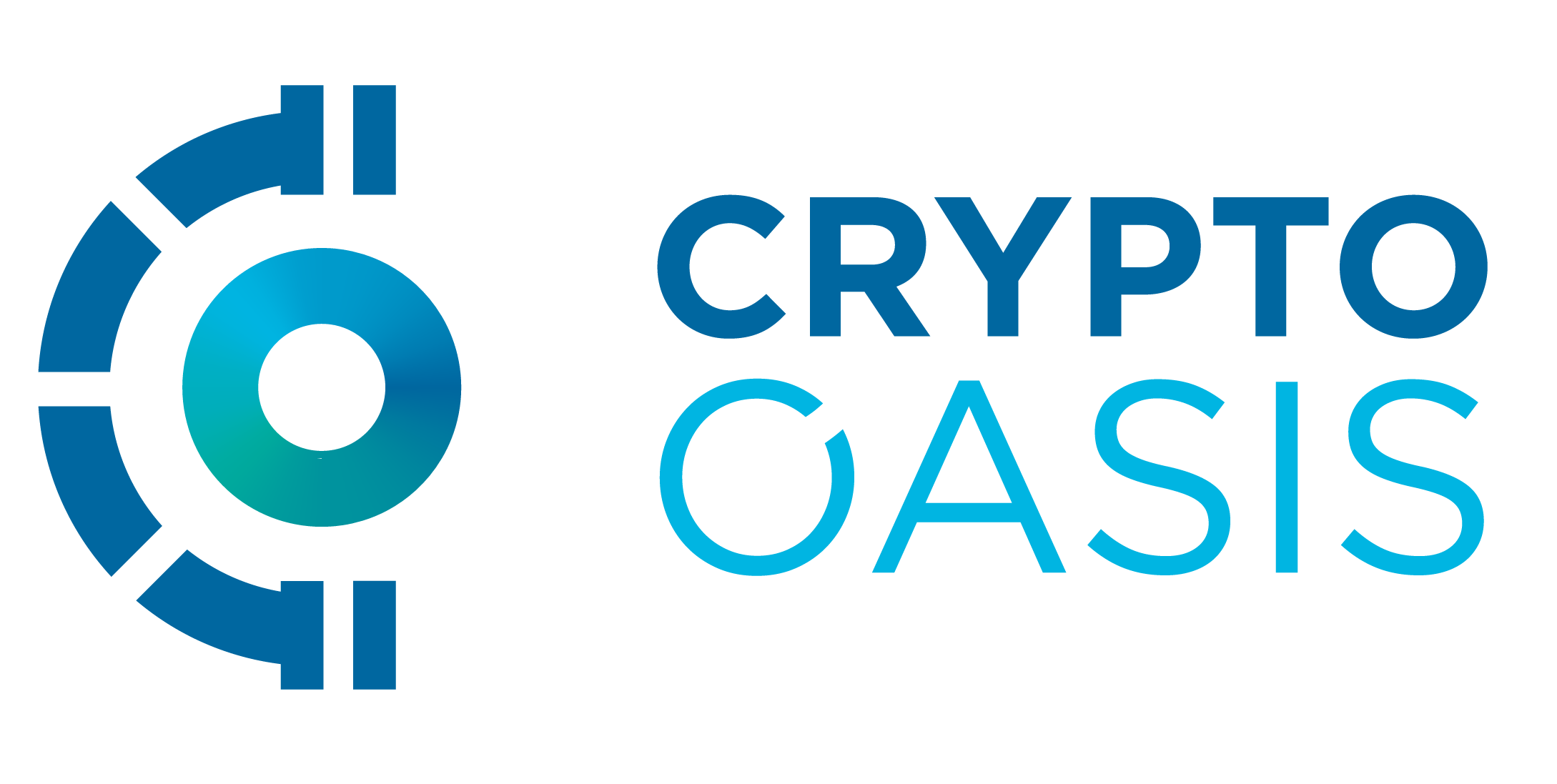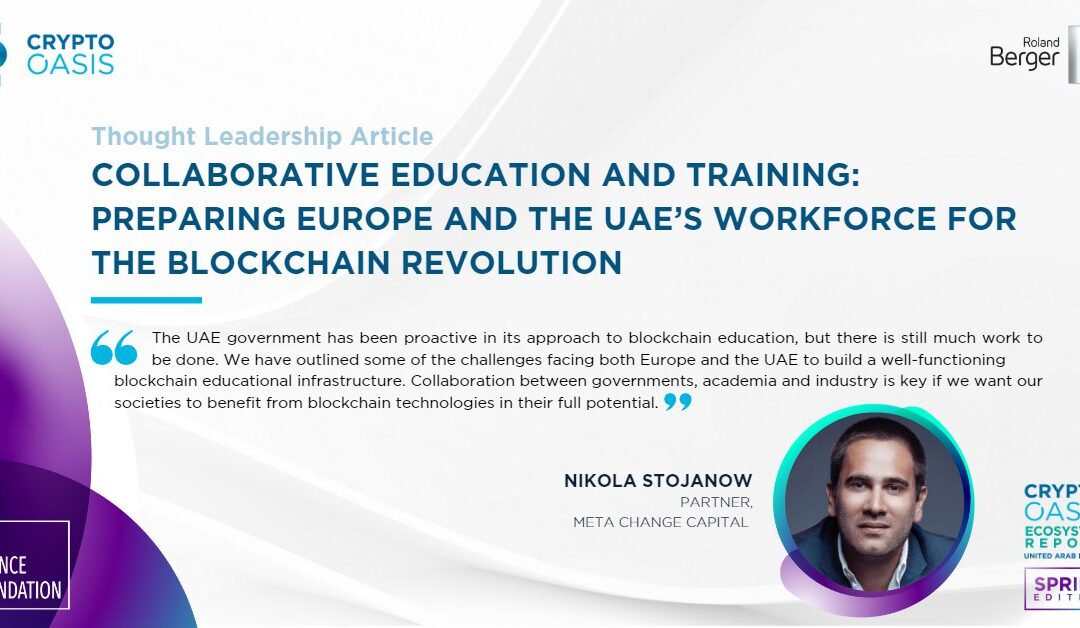Collaborative Education and Training: Preparing Europe and the UAE’s Workforce for the Blockchain Revolution
The time has come to prepare for the future for the next wave of global a and distributed talent pool.
The UAE has made significant strides in developing a strong knowledge economy, but there are still gaps in education and training that need to be addressed to be ready for what’s coming next. We have seen early collaborative efforts between governments, businesses, NGOs and academia to bridge these gaps by providing opportunities for learning blockchain, but education takes time. Developing programs that teach skills needed for careers in this field; connecting people who have relevant experience with those who don’t yet have it; and providing access to resources like funding or hardware so they can experiment with new ideas without having too much risk on their own shoulders, this is the goal!
Collaborative education and training provide access to resources that may not be accessible otherwise, such as industry experts, mentors and peers.
You can learn from each other by sharing experiences and knowledge. This will give you the opportunity to develop new skills in areas such as blockchain technology or digital currencies which are becoming increasingly important in today’s world economy.
Collaborative education allows you to gain a better understanding of how different industries operate so that when it comes time for you to find yourself a job after graduation, there will be no surprises when it comes down choosing between offers from different companies (or even industries).
The European Union (EU) is home to some of the world’s most advanced economies. As such, it’s no surprise that many of these countries are looking to blockchain technology as a way to improve their talent pool and prepare for future economic growth.
In fact, according to a recent study conducted by PwC UK, 65% of businesses plan on investing in blockchain technology within the next three years. However, this doesn’t mean that every company in Europe has adopted distributed ledger technologies yet; there are still many who have yet to take advantage of what DLT offers them–or even understand what it means for their industry!
To help bridge this gap between knowledge and actionable steps toward implementing DLT into everyday life at work or school environments across Europe (and beyond), we’ve compiled some resources below where one can learn more about collaborative efforts taking place across our continent right now:
The UAE’s human resource is comprised of approximately 12 million people, with more than half of them living in Dubai. The country has one of the highest rates of literacy in the world and has been ranked as having one of the best education systems by several international organizations.
The UAE is also home to some of the most innovative companies in the world, including Microsoft and IBM who have both made investments into blockchain technology through initiatives like Blockchain Labs and Hyperledger Fabric respectively. These companies are working together with government agencies such as Dubai Future Accelerators (DFA) who aim to accelerate innovation through collaboration between industry experts and government bodies such as Smart Dubai Office (SDO).
In addition to these initiatives there are also many existing collaborations between private sector entities within Dubai itself; including partnerships between universities such as NYU Abu Dhabi University which offers courses focused on blockchain technology development skills training alongside other skillsets relevant for this emerging field such as artificial intelligence programming languages like Python or Javascript.
By providing increased efficiency and transparency, organizations have the opportunity to work together seamlessly, regardless of their size or location.
Blockchain technology can be applied in many different industries; examples include education, healthcare and finance.
We need to develop new skills and knowledge, to teach and supply people with new skills needed. This can be achieved through education and training programs that are tailored towards specific roles within the industry. The majority of larger companies in the Web3 space are moving towards the UAE, getting them involved should be a priority. Partnerships between governments, universities, businesses and NGOs can help facilitate these initiatives by providing resources that allow people from all backgrounds access to these programs.
The UAE’s Ministry of Human Resources & Emiratisation has already announced plans to launch an educational initiative called “Smart Nation 2020” which aims at building a smart society through innovative technologies such as artificial intelligence (AI), robotics, big data analytics etcetera; as well as developing new job roles like data scientists who will work with AI systems in different sectors such as healthcare or finance.
The role of governments in collaborative education and training is to create a supportive environment, set standards, and fund initiatives. This can be done through legislation that ensures the protection of intellectual property rights (IPR) and creates an enabling environment for blockchain technology adoption. It also includes providing incentives for businesses to invest in digital transformation projects by reducing taxes on profits generated from such activities or providing tax breaks for R&D expenditure related to blockchain technologies.
Governments play an important role by funding educational institutions that are focused on developing curricula around emerging technologies such as blockchain or artificial intelligence (AI). The UAE government has taken steps towards this goal by launching its own university called “UAE University” last year; it plans to offer courses related specifically on these topics within five years’ time. There is a number of great initiatives available, it is just about connecting the right dots.
To prepare a good blockchain educational hub, businesses need to invest in training and development. They can do this by providing resources like funding or space, as well as creating job roles that are relevant to blockchain technology.
Businesses should also work closely with educational institutions on collaborative projects such as apprenticeships and internships so that students can get hands-on experience with real world applications of blockchain technology before they graduate from university.
The role of educational institutions in collaborative education and training is to develop courses and programs, provide resources, set standards and ensure quality assurance. They can also help students gain access to new technologies by providing them with the necessary skillsets required for this emerging field.
It’s time to get involved! The UAE government has been proactive in its approach to blockchain education, but there is still much work to be done.
We have outlined some of the challenges facing both Europe and the UAE to build a well-functioning blockchain educational infrastructure. Collaboration between governments, academia and industry is key if we want our societies to benefit from blockchain technologies in their full potential.

